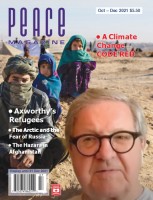
Peace Magazine October-December 2021, page 4. Some rights reserved.
Search for other articles by Metta Spencer here
Disease, hunger, violence, exploitation, and ignorance are chronic problems that have killed millions of our ancestors and numerous societies. Yet, our species has survived and made headway. Life expectancy and the comforts and conveniences of our physical surroundings improve with every new advance in air conditioning, Tylenol pills, Wikipedia, and hip replacement. We should greet each new day with enthusiasm and optimism.
Yet the current crisis of humankind is the worst ever. Even as chronic problems are solved, new threats are emerging for which there is a brand-new adjective: “existential.” The word “existentialism” used to denote the moral philosophies of Kierkegaard or Sartre. Now “existential” describes a potential disaster that might wipe out our species. We never needed such a term before because no such possibility seemed to exist. Now it does, and it’s real.
The new threats include variants of the old, chronic threats — famine, pandemics, violence — plus new ones that result from technological change itself: cyber risks, radioactive contamination, and climate change. Moreover, these new threats are global in scope. Even empires were never world-wide before, but now the whole human population is at risk from several different threats, each of which could be “existential” and each of which would trigger one or more of the others in a catastrophic cascade.
A few of the existential threats are beyond our immediate control: the impact of a meteor, an explosion of super-volcanoes, a burst of gamma rays from outer space, or of methane or hydrogen sulfide from the ocean floor. Fortunately, those are not the most probable ones. Ample scientific information exists to prevent the most dangerous disasters.
If so, why do they remain “existential” in scope? If we know what to do, why don’t we just do it? Ah, that’s the real cause for gloom. The solutions are in our own heads and within our collective capacity, but we are making insufficient progress because of our own ignorance — indeed, ignorance that is intentional, willful. Our governments are largely democratic — responsive to voters — but their decisions reflect a deliberate denial of reality. A pandemic is raging because people refuse the vaccines that would save them. Atmospheric heat will kill our own grandchildren because we insist on flying on planes and going on cruises. We keep paying for the very weapons that will destroy us all. Never before has humanity faced a crisis of this magnitude and of its own making. Democratic institutions cannot defeat irrationality. What can? Try talk! Daily serious talks with neighbors and co-workers about serious issues. Let’s cultivate the patience to reason with each other tenaciously.

Peace Magazine October-December 2021, page 4. Some rights reserved.
Search for other articles by Metta Spencer here